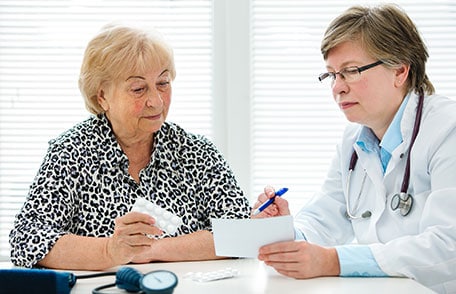Get Tested for Chronic Kidney Disease

You may have a strong stomach and your heart may be in the right place, but how well are your kidneys working? If you have risk factors for kidney disease, ask your doctor about getting tested to find out your kidney health.
Your kidneys aren’t very large—each is just the size of a computer mouse—but they’re hard-working. They filter all the blood in your body every 30 minutes, removing wastes, toxins, and excess fluid. They also help control blood pressure, stimulate production of red blood cells, keep your bones healthy, and regulate blood chemicals that are essential to life.
Each kidney is made up of millions of tiny filters called nephrons. Over time, nephrons can become damaged by diabetes, high blood pressure, or other causes and stop working, a condition called chronic kidney disease, or CKD. Healthy nephrons can make up the difference for a while, but if not treated, CKD usually gets worse. CKD can lead to kidney failure, also known as end-stage renal disease (ESRD) or Stage 5 CKD. A person with ESRD will need regular dialysis (a treatment that filters the blood) or a kidney transplant to survive.
CKD and Women
Chronic kidney disease (CKD) is more common in women than men, but fewer women are on kidney dialysis. Why?
One reason is that CKD progresses more slowly in women so they don’t need dialysis as soon as men. But awareness may play an even bigger role. Women are less likely to know they have moderate to severe CKD than men, so they often start dialysis later or receive no dialysis at all.
If you think a friend or family member might be at risk for CKD, encourage her to put a kidney checkup on her calendar. Treatment can improve her kidney health!
Could This Be You?
Approximately 15% of US adults (37 million people) are estimated to have CKD, but because early CKD has no signs or symptoms, most don’t know they have it. If you have any of these risk factors for CKD, talk to your doctor about getting tested:
- Diabetes
- High blood pressure
- Heart disease
- Family history of CKD
It’s also important to note that African Americans, Hispanic/Latino Americans, and American Indians are at higher risk for CKD.
Your Mileage May Vary
High blood pressure and diabetes are the leading causes of CKD. Approximately 1 in 3 adults with diabetes and 1 in 5 adults with high blood pressure could have CKD. Also, the number of young people with type 2 diabetes is increasing. That’s important because having diabetes for a longer time means more time to develop diabetes complications, including CKD.
Diabetes is the most common cause of end-stage renal disease (ESRD), accounting for 44% of new cases. African Americans are about 3 times more likely to develop ESRD than whites. Hispanics are about 35% more likely to develop ESRD than non-Hispanics. And there’s a gender gap: men are nearly 65% more likely than women to progress to ESRD.

Getting a checkup? Make sure to get your kidneys checked, too.
Find it Early, Treat it Early
If you’re at risk for kidney disease, get your kidneys checked regularly, which is done by your doctor with simple blood and urine tests. Regular testing is your best chance for identifying CKD early if you do develop it. Early treatment is most effective and can help prevent additional health problems.
Your treatment and management plan may include taking medications and making lifestyle changes—including choosing healthy foods and getting physically active—as well as working to keep your blood sugar and blood pressure numbers as close to target as you can.
Kidney-Friendly Tips
- Keep your blood pressure below 140/90 mm Hg (or the target your doctor establishes for you).
- If you have diabetes, stay in your target blood sugar range as much as possible.
- Get active—physical activity helps manage blood pressure and blood sugar levels.
- Lose weight if you’re overweight.
- Get tested for CKD regularly if you’re at risk.
- If you have CKD, meet with a dietitian to create a kidney-healthy eating plan. The plan may need to change as you get older or if your health status changes.
- Take medications as instructed, and ask your doctor about blood pressure medicines called ACE inhibitors and ARBs, which may protect your kidneys in addition to lowering blood pressure.
- If you smoke, quit. Smoking can worsen kidney disease and interfere with medication that lowers blood pressure.
- If you have diabetes, include a kidney doctor (nephrologist) on your health care team.
Prediabetes and CKD Prevention
With prediabetes, blood sugar levels are higher than normal, but not high enough yet to be diagnosed as diabetes. Prediabetes puts people at increased risk of developing type 2 diabetes, heart disease, and stroke. If you have prediabetes, preventing or delaying type 2 diabetes can also help prevent kidney disease. Visit DoIHavePrediabetes.org to find out your prediabetes risk. The website features a short quiz, lifestyle tips, and links to prevention programs across the country that are recognized by CDC as part of the National Diabetes Prevention Program.
Tracking CKD
CKD has an enormous impact on health, quality of life, and health care costs and is a national public health priority. The CKD Surveillance System documents and monitors CKD and its risk factors in the United States and tracks progress in CKD prevention, detection, and management.
No comments:
Post a Comment